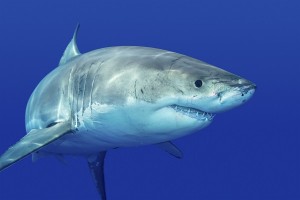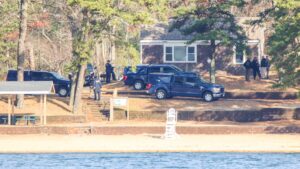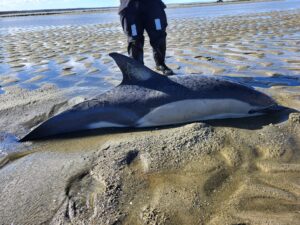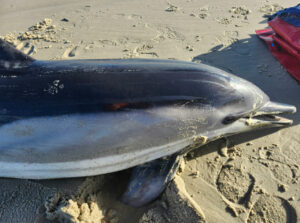
A great white shark.
CHATHAM – The state’s foremost shark researcher Dr. Gregory Skomal will be heading out into the waters surrounding Cape Cod this week for year two of a major great white shark population study.
“We’re going to get out there and try to, based on last year’s and this year’s work and even next year’s work, be able to give folks living on Cape Cod and those visiting here a sense of the population size of white sharks that are visiting,” Skomal said of the study.
Skomal, a state fisheries biologist, is continuing the study to track the number and movements of great white sharks off Cape Cod.
In the first year of the study, Skomal tagged 68 great white sharks in waters off Chatham and Orleans in weekly trips made mid-June through October 2014.
In year two of the study this year, Skomal said they will be able to see if any of the sharks spotted last year return to the region’s waters.
Skomal said he will be headed out twice a week this summer in research trips sponsored by the Atlantic White Shark Conservancy, a nonprofit set up to aid in funding for the research.
Skomal said the study in Cape Cod waters is the first major research done on great white sharks on the eastern seaboard.
“The white shark has been shrouded in mystery basically forever and for the first time starting about six years ago, we began tagging these fish to get a sense of what extent they hang around Cape Cod and where do they go when they leave here,” he said.
Atlantic White Shark Conservancy President Cynthia Wigren said of the population study, “The goal is to find as many white sharks as possible and for the population study to get as much footage of the sharks as we can.”
Wigren said last year’s study worked so well that they will be working with the same spotter pilot and photographer Wayne Davis again and do the trips with a board member who donates his boat, time and piloting skills for the trips.
“We’re excited to see the results of this year, how many sharks come back this year,” she said.
Last year, scientists started to catalogue the sharks and Wigren said it will be interesting to see this year which sharks, identifiable by their markings, will be spotted again.
Chatham Harbor master Stuart Smith said he keeps in close communication with Skomal and conservancy as they work throughout the summer off the coast of Chatham.
One change this year is that the researchers will be setting up their own buoys with shark-tracking equipment. In the past, the harbor master’s office has put the buoys in place. “They’ve been working on putting out all their buoys and receivers on the buoys to be deployed,” Smith said. “It’s the first year they’ll do that.”
With the public’s interest in the sharks has come entities seeking to profit from the creatures proximity to shore, but new regulations have been put in place this summer that requires state permits for those entities.
Wigren said those regulations will not affect Skomal’s population study.
Wigren said the conservancy has always been in favor of restrictions and oversight.
“We don’t see it impacting the study or the science at all, but we’re very happy to see the state has taken steps to really evaluate what else is going on in other places and take best practices to bring back here,” Wigren said.
The regulations do put a permit process in place and require oversight for shark tourist activities, like shark cages and chumming. Current regulations already prevent organizations from landing a great white shark without a proper permit, Wigren said.
“This new regulation in place will help safeguard against activities that might affect behavior and not having oversight is irresponsible in this area,” she said.
The new regulations now will require a permit from state Division of Marine Fisheries for an entity attracting sharks or seeking to contact them using cages or chumming.
Chatham Harbor master Stuart Smith said his town has already had regulations in place to prevent people from attracting sharks on purpose.
“The town of Chatham has a long standing bylaw in place that prohibits the disposal of any sort of dead fish in the water. We’ve been able to police the chumming of sharks through that bylaw,” Smith said.
As for the prevalence of sharks off the town of Chatham’s beaches, Smith said the town will continue with a program that has been in place for several years in which officials through the police departments notify other towns up and down the coast if a shark is spotted.
“The whole tact has been to keep the public informed through education. It’s a great opportunity to educate people on not only those animals in the water but others as well,” Smith said.
Smith said people who are concerned about great white sharks in the ocean beaches can go to the town’s south-facing beaches on Nantucket Sound, like Hardings, Ridgevale and Cockle Cove, where there have never been sightings of great white sharks.
Wigren said her organization’s website is among the places people can find safety information about great white sharks.
“I think people should be aware of watching the signs, listening to lifeguards and following the safety information that is out there,” Wigren said.
The shark research comes with a hefty price tag and the Atlantic White Shark Conservancy will continue to fundraise throughout the summer.
Wigren said, last year, the conservancy spent about $60,000 on the research plus in-kind donation of the boat, which cut in half the cost.
Wigren said this year’s trips will cost about $70,000.
On August 13, the Puritan Cape Cod location in Chatham will hold an event with a special Patagonia shirt for sale to benefit the research.
In addition, National Geographic photographer Brian Skerry will do a benefit lecture in September on Cape Cod to benefit the research.
There will also be two White Shark and Whale expeditions out of Plymouth in September that will benefit the cause, Wigren said.






















